48 hours in. . . Lanzarote, an insider guide to the land of volcanoes and vines

- Oops!Something went wrong.Please try again later.
Lanzarote’s history is as turbulent as the sweep of volcanoes that forged it and today still spectacularly dominate one of Macaronesia’s most dramatic islands, whose entirety is a Unesco Biosphere Reserve. Legends swirl around of daring adventurers and scheming pirates, through to marauding Berbers and conquering Spaniards. Since the 1960s affordable jet travel has brought a wave of new arrivals to the beach resorts of Puerto del Carmen, Costa Teguise and Playa Blanca.
Largely thanks to visionary local artist César Manrique development has been kept both pleasantly low-key and low-rise. Manrique also helped create and curate many of the island’s most impressive cultural attractions, forge viewpoints and create outdoor sculpture. His legacy is an island where style and design very much accompany substance, whether you are reclining in one of the bountiful vineyards with a glass of superb Malvasia, enjoying boat fresh seafood in an oceanfront restaurant or just lazing on one of Lanzarote’s shimmering necklace of sandy beaches.
Day one
MORNING
You really need to hire a car on Lanzarote as public transport is limited in scope and not regular enough for easy touring. Drive straight to the volcanic heart of Lanzarote delving into the otherworldly Timanfaya National Park (00 34 928 118 042). Hop on a bus tour here, embark on a hike, even head off on a camel or just learn about the landscape at the visitor centre.

Continue south, seeking out the Atlantic at El Golfo, a strikingly set village that sits between rugged volcanic scenery and the cobalt ocean. It's easy to see why it's on many a postcard, with its trim whitewashed buildings sitting right on the volcanic shores. You should park up at the free car park as you approach the village. Be sure to make the short hike to gaze out over the Charco Verde (Green Lagoon). If it looks familiar, El Golfo starred in Pedro Almodovar’s Broken Embraces, which starred Penelope Cruz.
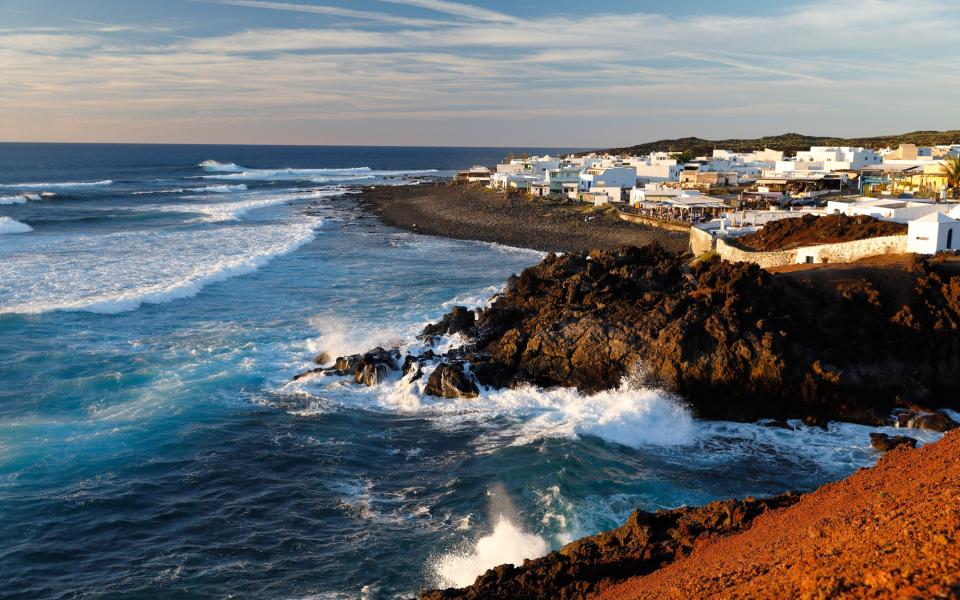
AFTERNOON
Handily, the tiny oceanfront village of El Golfo is home to a sprinkling of seafood restaurants. Recline into the terrace table you’ve booked in advance at Costa Azul (Avenida Maritima 34; 00 34 928 17 31 99) and choose from the fresh fish display as the Atlantic surf bashes in the background and a waiter pours you a glass of Lanzarote’s finest (Malvasia that is). You’ll want to get your tastebuds tingling with perhaps garlic prawns to kick off before some simply grilled fresh fish, or a hulking pan of paella. Stick to one glass of vino as you’ll want to appreciate the full wonder of the great man who forged how stylish Lanzarote looks today at the Fundación César Manrique (Calle Jorge Luis Borges, 16; 00 34 928 118 042).
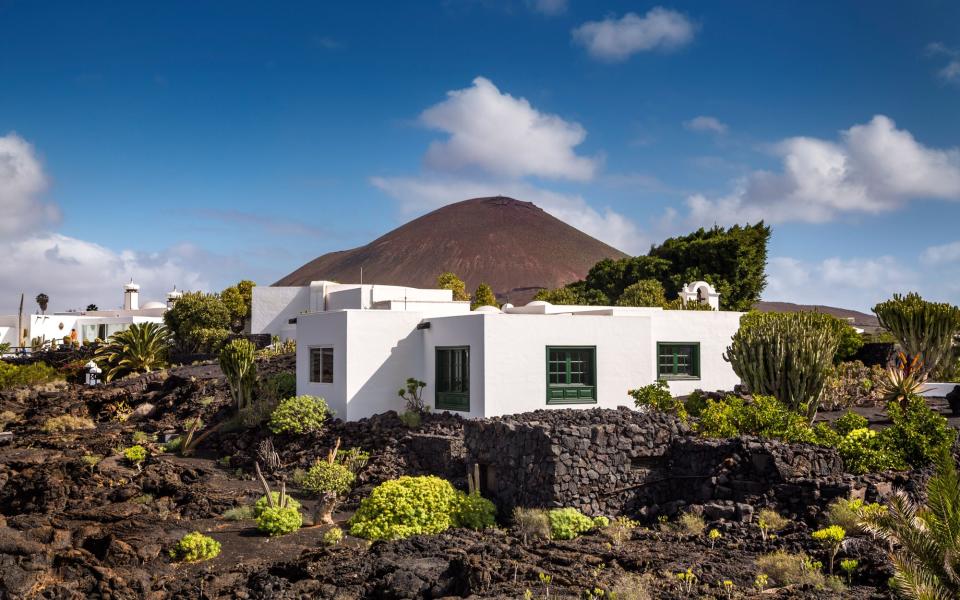
LATE
Take a stroll around Arrecife’s picturesque Charco de San Gines waterfront before it’s cocktail time as the sun melts over the Atlantic and you step out of the lift on the 17th floor of the only skyscraper in Lanzarote. The Gran Hotel’s Star City Coffee & Gastro Bar (Parque Islas Canarias; 00 34 928 800 000) in Arrecife boasts myriad cocktail choices to accompany its sweeping floor-to-ceiling windows.
Dine fashionably late (or just at the normal time for many of the locals) at Restaurante Lilium (Av. Olof Palme; 00 34 928 52 49 78). Michelin are fans. So will you be after seeing Canarian produce and cuisine reinvented into deliciously fun culinary creations. It’s well worth its Michelin Bib Gourmand. Afterwards enjoy a stroll around the glitzy new marina where the restaurant is housed.
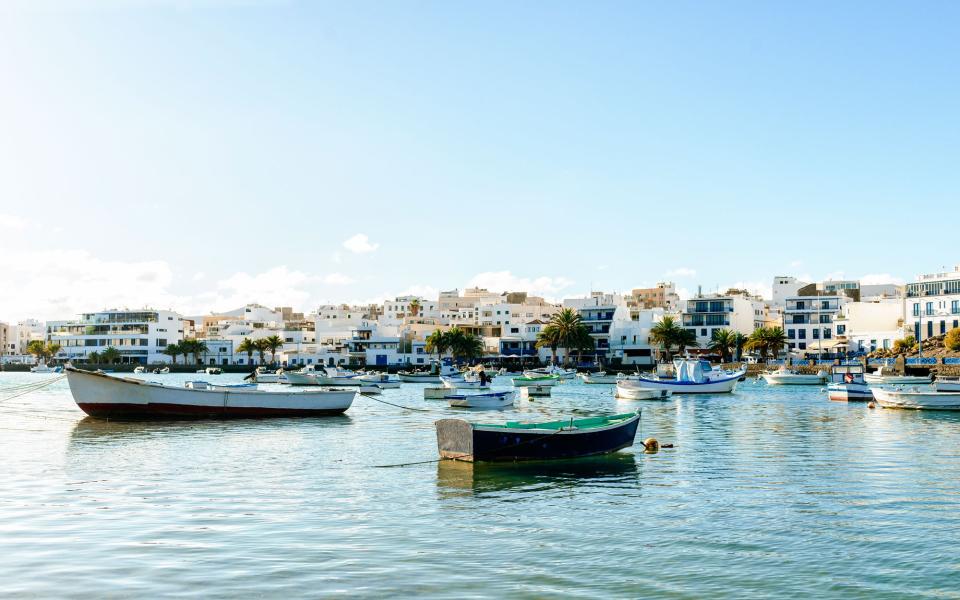
• The best restaurants in Lanzarote
Day two
MORNING
With so many beaches it would be a shame to miss the pleasures of what brought holidaymakers to Lanzarote in the first place – a beach. Actually, why not make it a round half dozen? That is what you get down at Punta Papagayo. Don’t like one stretch of sand? Well just move to the next one. And don’t forget a snorkel or at least a good book. Half the fun is getting here as it’s a bumpy drive, walk, cycle or a spectacular boat ride in (go for the boat).

AFTERNOON
Whatever you do make sure you end up at the most famous beach, Playa Papagayo, which boasts the sort of simple chiringuito (beach bar) that all islands should have. We’re talking the smell of salty air and sand in your toes as you dine, rather than white linen and slick waiting staff. The stripped down menu offers fresh fish with irresistible papas arrugadas (wrinkly potatoes).
Heading slightly north you come into La Geria, the epicentre of Lanzarote's wine production. Every producer boasts their own charms – some even have those single vines in volcanic craters you see on the postcards. You can tick off a few wineries on a leisurely exploration – Bodegas Vega del Yuco (Camino del Cabezo; 00 34 928 52 43 16), Bermejos (Camino a Los Bermejos; 00 34 928 52 24 63) and the oldest winery in Lanzarote, El Grifo (LZ-30, Km 11. San Bartolomé; 00 34 928 52 40 36), don’t disappoint. If you find yourself waylaid by wine leave the car at a winery or in a village and catch a taxi back to the hotel.
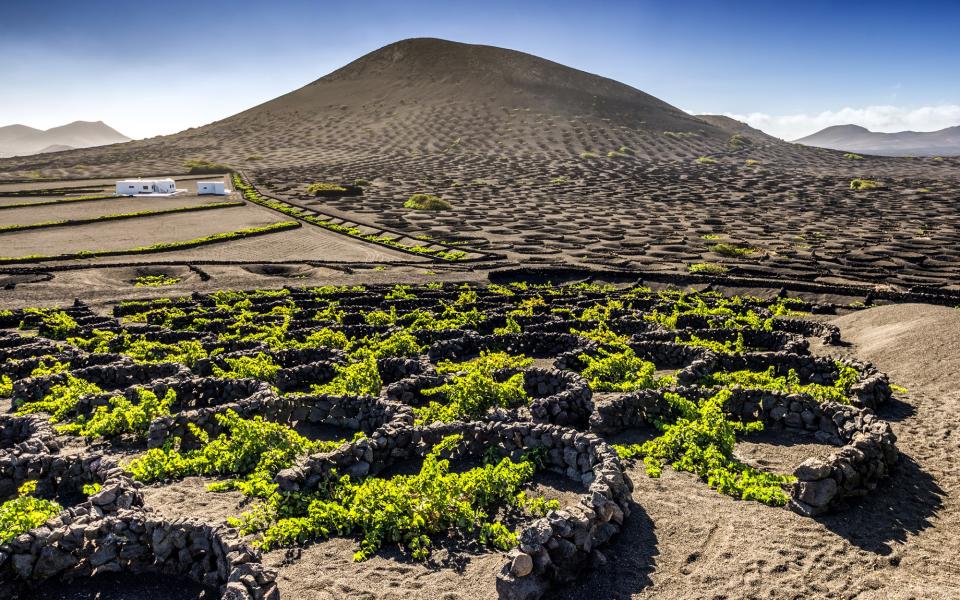
LATE
Dine out with César Manrique, or at least his delicious architectural legacy, at the Jameos del Agua (Carretera Orzola; 00 34 901 20 03 00). He brilliantly refashioned the lava tubes here to conjure up a unique space woven around the volcanic caves. Afterwards, linger on and sip on a cocktail as the live DJs (in summer) keep things bubbling along.
Or, if it’s a fine evening, drive, walk or take a taxi away from your hotel. Lanzarote is famous for its clear skies and the lack of light pollution makes stargazing a joy. The Penas del Chache is the island's highest point at 670m and provides epic stargazing. Handily there is road access with a car park. Or, drive up to the village of Haria in the quieter north looking out for places to gaze at the stars as you go.

• The best nightlife in Lanzarote
Luxury Living
On the seafront in the capital of Arrecife, the Gran Hotel & Spa stands tall above its city neighbours (it is the only skyscraper in Lanzarote). Polished floors, stylish furnishings and swathes of wood and marble provide a cool sanctuary from many bars, restaurants and shops on the doorstep.
Doubles from €84 (£73) a night. Parque Islas Canarias; 00 34 928 800 000
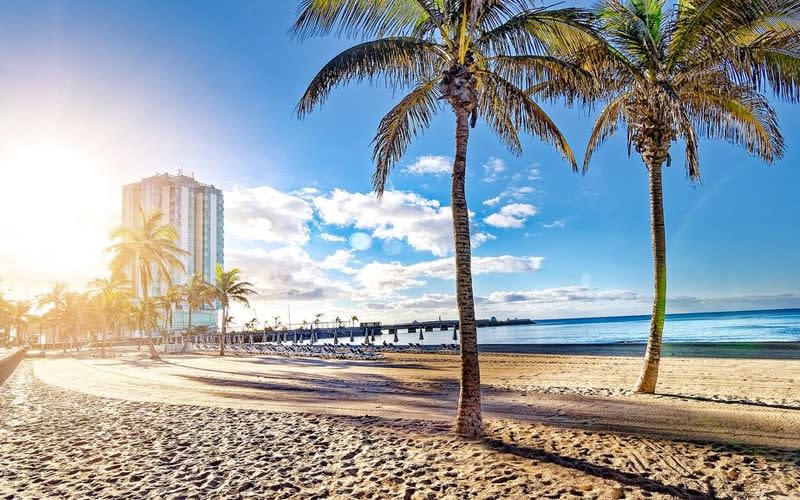
Arty Apartments
Nautilus is an eco-chic collection of 70 apartments set inside sumptuous seaside grounds. Rare botanical species, a stunning pool and over 700 pieces of original art cast an aura of serenity and sunshine. The clued-up reception can book anything from a diving course to a Slow Food supper.
Apartments from €85 (£71). Calle Gramillo 5; 00 34 928 51 44 00.
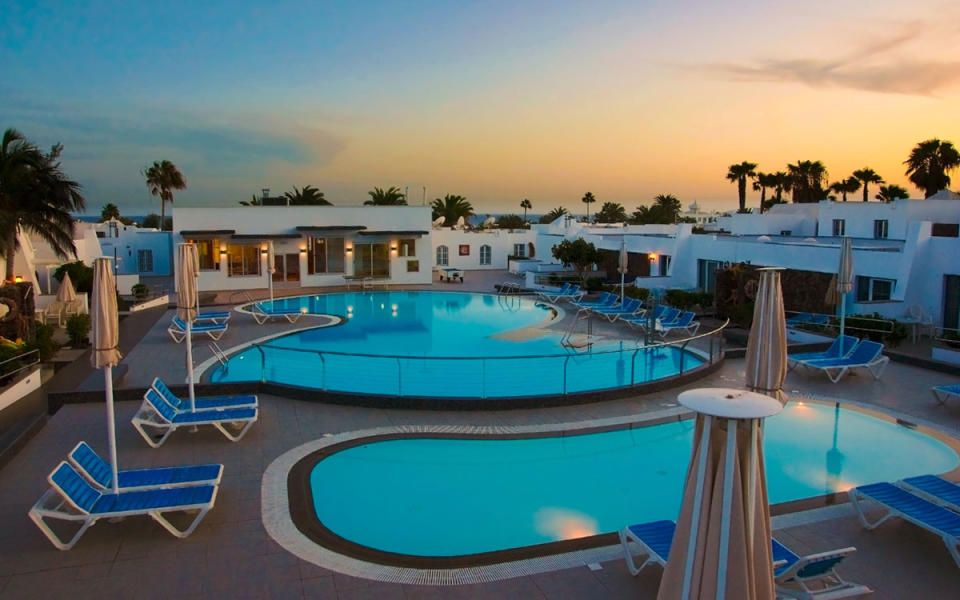
Budget Beauty
Caserio de Mozaga is a lovely traditional 18th-century farmhouse in typical Lanzarote style, which means a low, white building with dark green paintwork and beamed ceilings. Run by a local family, the various farm buildings have been turned into a laidback hotel which is not ultra luxurious but has plenty of character and rustic charm.
Doubles from €80 (£70). Malva, 8; 00 34 928 520060
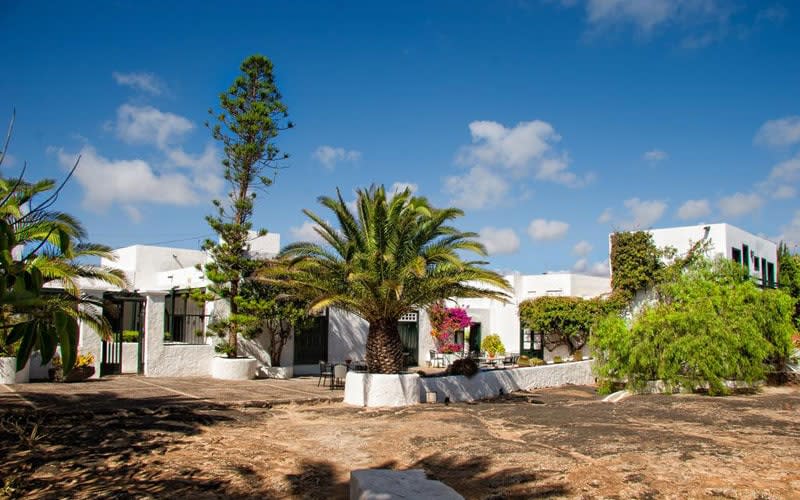
• A complete guide to the best hotels in Lanzarote
Whether dry or sweet, Lanzarote arguably gets more out of the Malvasia grape than anywhere else so snare a bottle or two. The striking blue bottle of Yaiza makes for a stylish candlestick holder afterwards.
Teguise’s Sunday morning market may offer a serious swathe of tat, but dig in deeply and you will also find quality leather goods, such as bags and belts, on sale at competitive prices.
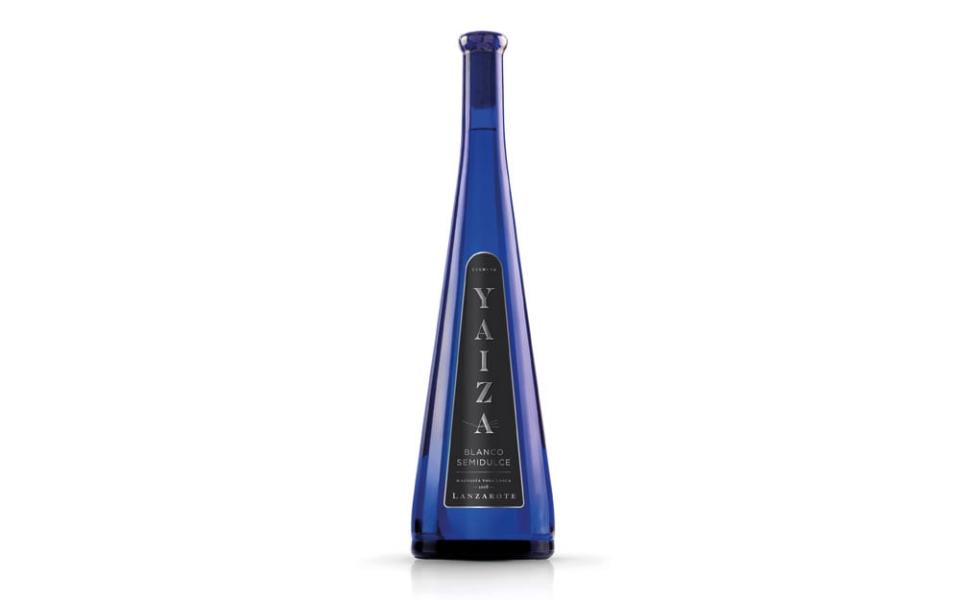
Given its idyllic location just off the northwestern coast of Africa, Lanzarote is a balmy year-round destination. Handily even in summer (June-August) cooling Atlantic breezes often keep the edge off the heat, so it’s not often stifling like Andalucia on the Spanish mainland. In winter temperatures do dip, but we’re not talking snow and frost. It can be windy at any time of year. The lowest occupancy times in hotels tends to be in second half of January after the festive rush. Festivals ripple across the island’s traditional towns and villages throughout the year, but the granddaddy of them all is Carnival, which bashes on for weeks in February.
• Tipping culture: there is no hard requirement to tip, but it’s polite to round bills up. If service has been especially good you can tip 10 per cent.
• Public transport: there are no trains or trams on Lanzarote, but the local bus network is clean, safe and reasonably efficient. The network is not totally comprehensive, though, and routes and timetables are geared more towards locals than tourists.
• Taxis: Uber doesn’t operate on Lanzarote, but there are a decent amount of safe and fairly reliable taxis in Arrecife, the airport and in the resorts. They are not a cheap way to get around. Make sure to always check that the meter is on – it usually is. Fares tend to be slightly lower than the UK equivalents.
• Etiquette when self-driving: they drive on the right hand side of the road in Lanzarote. The road network is in reasonable condition, but some more remote beaches lie down dirt tracks so watch out where you take your hire car. Also watch out for locals bashing on to quieter rural roads in front of you without even looking or indicating.
• Note that if you want to explore Lanzarote properly you’ll need your own car. There are myriad companies at the airport, but visitors have reported problems with some of them with overcharging for extras and false damage reports. Book online through UK-based car hire aggregator Holiday Autos and they will help you deal with any problems on the ground in English.
• The standard local greeting is a kiss on both cheeks, but handshakes are fine too especially if they know that you are a tourist.
• Spaniards tend to dine later than their British counterparts, often not until 9pm or 10pm. This is reflected in Lanzarote, but in most of the tourist-oriented restaurants they are used to visitors dining earlier.
• Lanzarote’s beaches are bedecked with tourists in various states of undress. This is normally tolerated on the sands, but be aware that beyond the beach bars bare chests and skimpy beachwear is not welcome in bars, cafés and restaurants where locals go.
• Most visits to Lanzarote are trouble free, but one major danger to be aware of is the ocean. This is the Atlantic with serious surf, undercurrents and rip tides. It’s always a good idea to check on conditions locally and just don’t get in if you are in any doubt. Note that the resorts tend to have stretches of sand available that are protected by lifeguards.
• Crime is relatively low on Lanzarote. One danger to look out for is leaving items on display in your car hire, even in car parks. Better still secure all valuables in your hotel safe.
The basics
Flight time: (from UK): Around four hours
Currency: Euros €
International dialling code: 34
Essential contacts
Tourist board information: 00 34 928 81 17 82, turismolanzarote.com
Emergency fire and ambulance: 112
Emergency police: 112
British Embassy: The relevant British Consulate (00 34 928 267 774; ukinspain.fco.gov.uk) representing the UK government in Lanzarote is in Las Palmas on the island of Gran Canaria. If you require urgent help after you’ve been attacked, arrested or lost your passport etc you should try to call 928 26 25 08
Author bio
Robin is a Macaronesia specialist and Telegraph Travel’s Lanzarote expert. He returns frequently to the most stylish of the Canary Isles. You can find him sipping a bone-dry glass of Malvasia overlooking Lanzarote’s bountiful volcanic vineyards.

